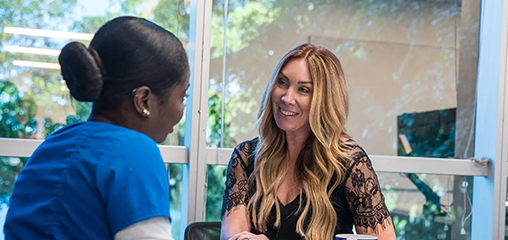
Sometimes, it can be difficult to talk about ourselves and brag about our accomplishments. As your nursing career progresses, it may be helpful to keep a record of your journey. A professional portfolio documents your education, skills, professional achievements, and nursing experience. It can be useful to help you advance in your career to show potential employers your skills.
Why is building a professional nursing portfolio important for your career?
Think of a nursing portfolio as a collection of career experiences and a visual demonstration of your skills. Portfolios showcase your knowledge, abilities, and progress as an individual, a student, and a professional. They also provide evidence of the competencies and expertise you’ve earned due to previous experiences. It is never too early to start a portfolio. If you are currently a nursing student, now is a good time to start building your portfolio.

What should you include? Portfolios include essential items like original documents, supporting material, and collateral artifacts that provide evidence of credentials, qualifications, and experience achieved during your career. Depending on your career path, you may include education, employment history, job performance, scholarships, political activism, community service, professional organization involvement, or other valuable attributes that showcase your unique qualifications, expertise, and passion.
As your career evolves and grows, a portfolio allows you to create an organized, evolving inventory of information. Nurses may organize portfolios in an electronic or hard-copy binder. Whenever you’re looking for a new job or advancing in your current role, your portfolio will be a resource for the hiring manager. Arizona College of Nursing offers career services to all our students that help guide you through the process of building a portfolio.
What can building a nursing portfolio help you accomplish?
- Keep a record of personal, academic, and professional activities and accomplishments.
- Guide decisions relating to education, training, and professional opportunities.
- Demonstrate learning and knowledge, skills, and abilities (KSAs) in specific areas.
- Provide detailed examples during performance-based interviews for employment opportunities, scholarships, grants, bonuses, or promotions.
- Reflect on personal growth and development.
- Capture prior experiences, challenges, and life lessons learned for academic or work credits.
How can nursing students start building their portfolio during school?
Every nurse has a unique journey. Your portfolio serves as documentation and reflects your path to a nursing career. Keep in mind portfolios are meant to provide past and present evidence (artifacts) that clearly demonstrate your competence associated with expertise, professional practices, processes, quality, and relationships.
 Your nursing portfolio may also contain an evolving career plan that includes professional goals and objectives of professional and educational nursing activities to support professional development and achievement of career aspirations. Always ensure your portfolio is up to date whenever you try to advance your career.
Your nursing portfolio may also contain an evolving career plan that includes professional goals and objectives of professional and educational nursing activities to support professional development and achievement of career aspirations. Always ensure your portfolio is up to date whenever you try to advance your career.
Additionally, your portfolio may help give others insight into your passion, attitude, and nursing approach. This section can include letters of appreciation, letters of recommendation, meaningful pictures, newspaper or newsletter publications, and other artifacts that display your professional history. While this section may seem arbitrary, nurses should be kind, fair, caring, and able to practice emotional stability, empathy, and compassion. Demonstrating that you’re all the above can significantly impact the hiring decision-making process at hospitals, clinics, or other medical facilities.
You may be wondering how and when to use a nursing portfolio. Start getting in the habit of adding to your portfolio in nursing school. Building your nursing portfolio can showcase your skills and can help you land that first job when you don’t have much work experience. Throughout your career, use your professional nursing portfolio for continuing education, professional development, and educational or employment goals.
For example, a nurse may utilize an up-to-date nursing portfolio when interviewing for a new job, discussing a promotion, applying for an appointed position in a regulatory agency, offering to serve as a board member in a professional nursing organization or even running for political office. In short, your nursing portfolio can come in handy at any point in your career.
Nursing Portfolio Checklist
Use this quick checklist to help ensure you do not forget anything in your professional nursing portfolio. Of course, you can customize your portfolio to correlate with your unique nursing journey, but every nursing portfolio should include the following:
- Name, Demographics, Health Records
- Education, License(s), Certification(s)
- CPR/BLS/ACLS/ATLS/PALS/NALS Cards
- CEU Certificates
- Professional Organization Membership(s)
- Nursing Philosophy
- Committees, Professional Projects
- Annual Performance Appraisal
- Professional Awards, Achievements
- Scholarly Publications
- Appreciation Letters (Supervisors, Peers, Patients)
- Future Career Goals
Nursing is career path that is constantly evolving. Keeping a portfolio means you have a record that can showcase your skills and accomplishments. If you are interested in pursuing a nursing career, the first step is enrolling in nursing school. Contact an advisor at: (855)706-8382 or visit: arizonacollege.edu to learn more.
 Authored by Barbara Halle, DNP, MSN, NPD, RN-BC
Authored by Barbara Halle, DNP, MSN, NPD, RN-BC
Sr. Director of Nursing Regularity Affairs
Arizona College of Nursing
Information in this blog post is accurate as of March 3, 2022.
Start Your Future in Nursing Today

If you’re considering a career as a registered nurse (RN), Arizona College of Nursing is here to help you pursue your dream. Our BSN program enables you to earn a Bachelor of Science in Nursing in just 3 years or less with qualifying transfer credits. We’ve helped hundreds of students to earn a BSN degree and enter the nursing profession – and we’re ready to support you on your path to becoming an RN.
Why Choose Arizona College of Nursing?
- Earn a BSN degree in 3 years or less with eligible transfer credits
- Campus locations throughout the US
- Night classes for general education courses
- Hybrid Online/In-Person format for general education classes
- Nursing education is all we do
- CCNE-Accredited Program*
- NCLEX-RN success coaches and exam preparation class
- Financial aid available to those who qualify
Discover Your Path to a Career in Nursing
Information in this post is accurate as of March 3, 2022.
*The Bachelor of Science in Nursing (BSN) degree program at Arizona College of Nursing is accredited by the Commission on Collegiate Nursing Education (https://www.aacnnursing.org/). All Arizona College of Nursing and Arizona College campuses are institutionally accredited by the Accrediting Bureau of Health Education Schools (https://www.abhes.org/), a U.S. Department of Education-recognized accrediting agency.








